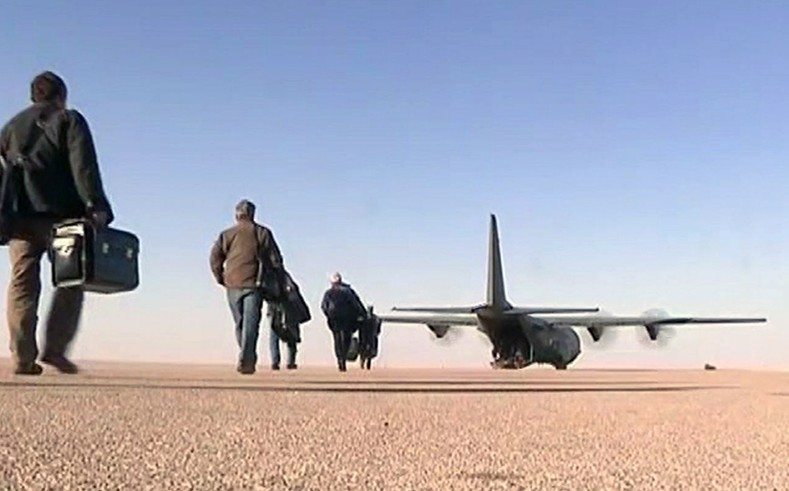Supporting the FCO-led operation to recover UK nationals, the MOD has utilised a range of assets to evacuate British citizens from Libya. Beginning on Thursday 24 February, an RAF C-130 aircraft, supporting FCO charter flights, collected 65 passengers, of which 52 were British (including one dog), from Tripoli airport, flying them to safety in Malta.
HMS Cumberland has been involved in two missions in the Libyan port town of Benghazi. Coming to the rescue of 207 evacuees on Friday 25 February (of which around 50 were British citizens), and picking up 218 entitled persons on Sunday (around 50 of whom were British nationals). Cumberland is currently returning from Libya to the Maltese port of Valletta.
In combined Royal Air Force and Special Forces operations, C-130 Hercules aircraft flew into Libya to recover UK citizens stranded at remote oil installations. The first operation, which took place on Saturday, recovered around 100 people from desert locations south of Benghazi. The second operation which flew into the eastern Libyan desert on Sunday rescued around 150 stranded civilians.
During the operation one of our C-130 aircraft appears to have suffered minor damage consistent with small arms fire. There were no injuries to passengers or crew and the aircraft returned safely to Malta. This incident shows how challenging the operating environment has been for our forces in assisting the evacuation efforts.
Prime Minister David Cameron said: “I’m sure everyone will be relieved; good work has been done today and I want to pay tribute to our brave Armed Forces personnel who carried it out.
“We’ve had three Hercules that have gone into the eastern desert area and they have brought back British nationals but also many, many others and it was a mission not without its difficulties. Also today we’ve seen HMS Cumberland pick up more people in Benghazi and it’s heading back to Malta; again some British but also many, many other nationalities that we’re helping as well. So that is good news, good progress. And now we’re putting serious pressure on the regime.
“We’ve introduced today a travel ban, asset freeze; there’ll be further export measures that will be taken as well in the coming hours. All this sends a very clear message to this regime: it is time for Colonel Gaddafi to go and to go now. There is no future for Libya that includes him.”
Asked about the risks of sending planes into Libyan airspace, the Prime Minister said: “It is risky and it is difficult but I judged it was the right thing to do because there are British citizens spread out across those oil platforms, particularly in the eastern desert area in Libya. We need to get those people home, we need to do it safely, we can do so helping other nationalities at the same time.
“Obviously Libya is a country in complete chaos and so it is difficult to arrange these things, but it was the right thing to do and I pay tribute to the very brave pilots and Armed Services personnel who managed to help so many British citizens back to safety. And I’m delighted they’ve been able to do that. That is part of what needs to be done. The next part is real pressure on this regime, the asset freeze, the travel ban, the measures we’re taking against the regime to show just how isolated they are.
“A very clear message tonight that it’s time for Colonel Gaddafi to go; he should go now and Libya’s future has no future with him at the helm – absolutely none.”









